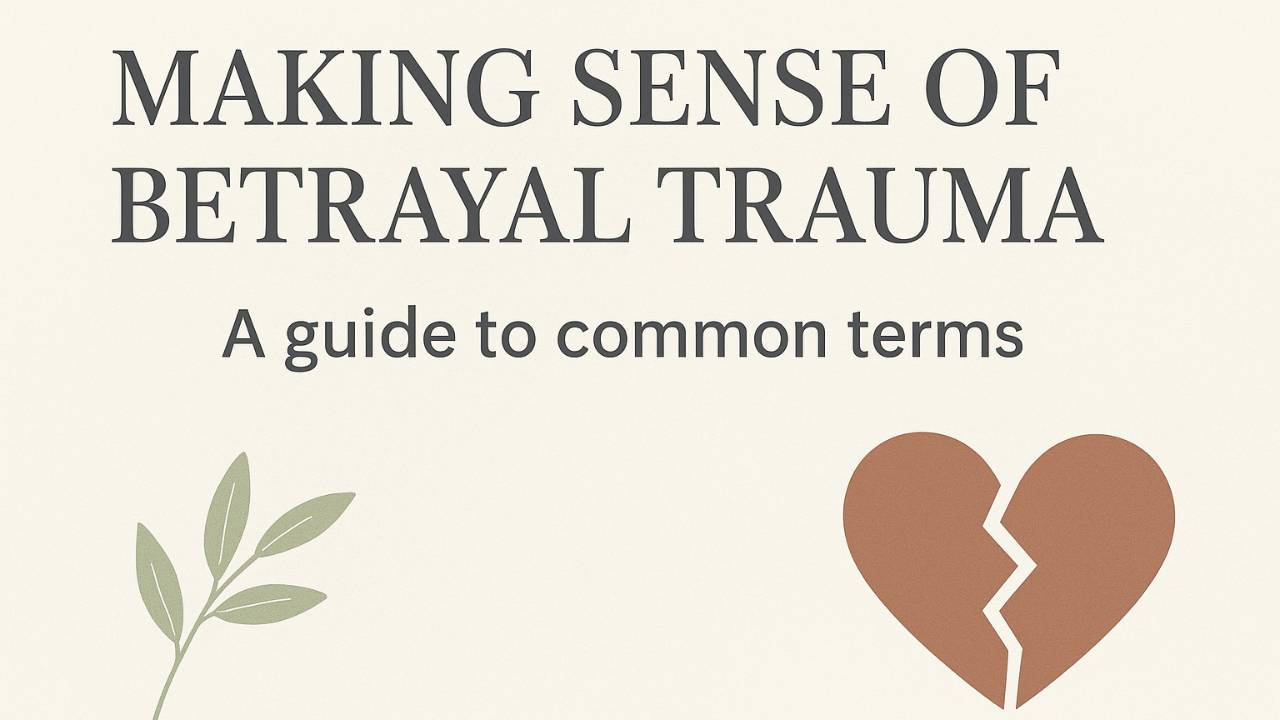Making Sense of Betrayal Trauma: A Guide to Common Terms
Sep 10, 2025
Discovering that your partner has been unfaithful is a deeply disorienting experience. It shakes your sense of safety and leaves you with an overwhelming wave of questions, fears, and confusion. In the aftermath, it's not uncommon to find yourself scouring the internet at all hours, trying to make sense of what’s happening—searching for anything that offers clarity, comfort, or just a sense of normal again.
That search is a big part of why I do the work I do—to help people find grounding, direction, and reassurance during a time that feels anything but stable. Still, even with so many resources available, it can often feel like everyone is speaking a language you haven’t yet learned. The betrayal trauma community, while incredibly supportive, uses a lot of terms and buzzwords that can feel foreign at first.
That’s why I’ve created this short guide—to give you a shared language that can help you better understand what you're reading, hearing, and experiencing. These definitions are meant to empower you as you navigate your healing journey.
Common Terms in Betrayal Trauma
D-Day
Short for “Discovery Day” or “Disclosure Day.” This marks the moment (or series of moments) when you first learn of your partner’s betrayal. For many, this is a life-altering event that reshapes your understanding of the relationship.
Full Therapeutic Disclosure (FTD)
A structured, therapist-guided process in which the betraying partner shares a comprehensive, truthful account of their behaviors. The goal is to create a shared reality and offer the betrayed partner the information needed to begin healing and make informed decisions about the future.
Trickle Truth
When information is revealed bit by bit over time, rather than all at once. This ongoing disclosure process can be retraumatizing, as new revelations continually shake the foundation of trust and reality.
Acting Out
This term refers to the compulsive sexual behaviors—often secretive and harmful—that the betraying partner engages in. These actions are typically driven by underlying addiction or compulsions and are damaging to the relationship.
Trauma Brain
A term that describes the cognitive and emotional state of someone after experiencing betrayal trauma. Symptoms can include confusion, memory issues, difficulty concentrating, heightened emotional responses, and a sense of feeling unlike yourself.
Trigger
Any stimulus—internal or external—that provokes a fight, flight, or freeze response because it reminds the brain of the original trauma. Triggers can be obvious or subtle, and they may not always make logical sense in the moment.
Flooding
When you are overwhelmed by multiple triggers at once, leading to a cascade of intense emotions, intrusive thoughts, and memories. In this state, it often becomes difficult—or impossible—to function as you normally would.
AP
Short for “Affair Partner”—the individual with whom the betrayal occurred.
CSAT
Certified Sex Addiction Therapist. These professionals are specially trained to work with individuals struggling with compulsive sexual behaviors and their partners.
APSATS
Association of Partners of Sex Addicts Trauma Specialists. An organization that certifies clinicians and coaches to work specifically with partners of sex addicts, using a trauma-informed approach.
Why This Matters
While this list is by no means exhaustive, it’s a starting point. Learning this language can help you feel more confident, more connected to your experience, and more able to engage in conversations—whether with professionals or peers—about what you're going through.
Betrayal is hard enough. You shouldn’t have to struggle just to understand the words used to describe it. I hope this guide helps remove at least one barrier from your healing journey.
You’re not alone. And you don’t have to figure it all out overnight. One step at a time is more than enough.


